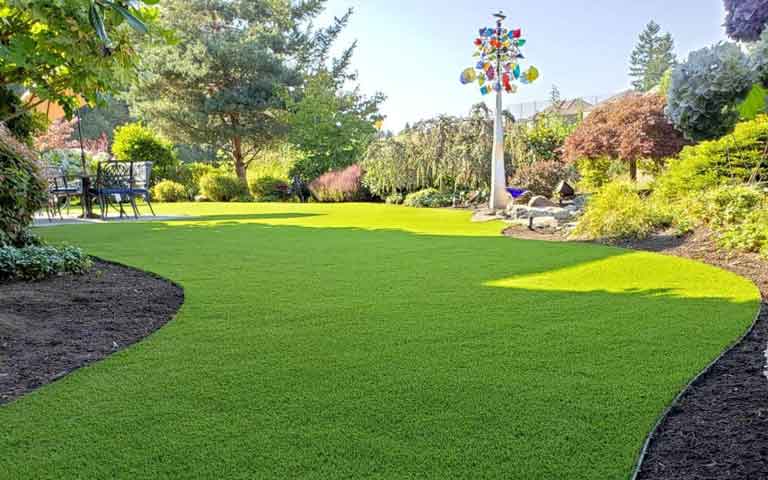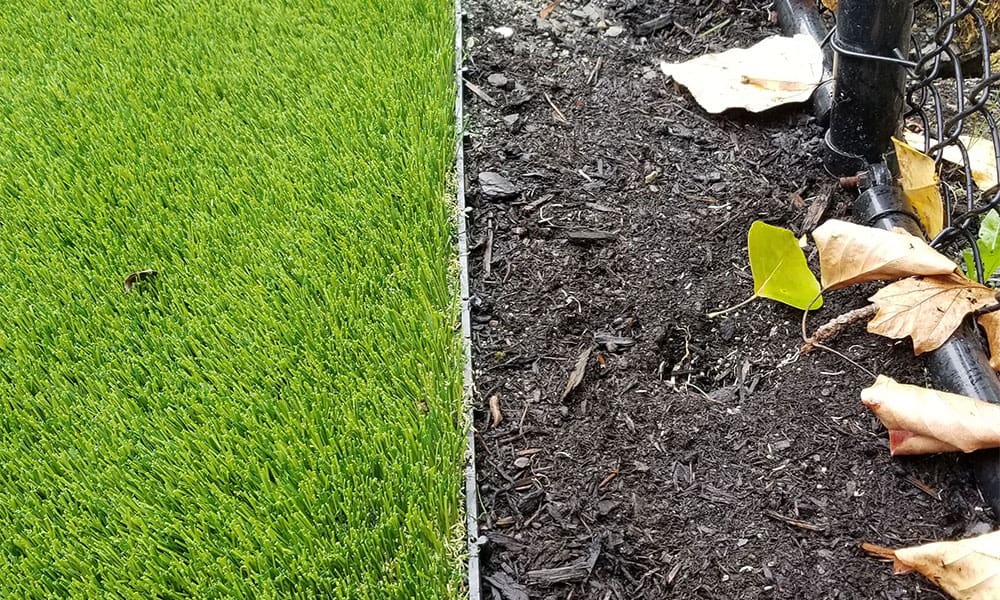Top Reasons to Take Into Consideration Artificial Grass for a Lavish and Low-Maintenance Yard
As homeowners significantly look for lasting remedies for outdoor spaces, fabricated grass provides an appealing choice to traditional yards. The benefits expand beyond mere aesthetic appeals and sustainability; discovering the complex ramifications of artificial grass discloses an extensive strategy to backyard monitoring that qualities much deeper consideration.
Year-Round Greenery
One of the most significant benefits of artificial yard is its capacity to provide year-round greenery, despite environment conditions. Homeowners frequently deal with difficulties in maintaining a dynamic grass due to seasonal modifications, dry spells, or hefty rainfall. Artificial turf eliminates these issues, making certain a consistently lush look throughout the year.
This artificial option is crafted to withstand different weather scenarios, from blistering summer season warmth to cold wintertime temperature levels. Unlike natural lawn, which may brownish or come to be patchy during extreme conditions, synthetic grass keeps its vivid shade and appearance, enhancing the aesthetic appeal of any type of landscape.
Furthermore, synthetic turf is resistant to parasites and illness that normally influence all-natural grass. This resilience contributes to its enduring elegance, as there is no need for chemical treatments or fertilizers that can be hazardous to the environment. In addition, homeowners can delight in the visual advantages of a properly maintained yard without the cyclical challenges posed by all-natural grass care (artificial grass canoga park).
Minimized Maintenance Efforts
Synthetic yard significantly minimizes maintenance efforts, allowing house owners to enjoy a beautiful yard without the taxing tasks related to natural grass treatment. Among the most remarkable benefits of artificial grass is the elimination of routine mowing. Without any requirement for a lawnmower, homeowners save both time and the expense of upkeep linked with this tools.

Cleaning artificial lawn is straightforward; a simple rinse with a hose pipe or the occasional brushing to remove particles is normally sufficient - turf installation. This ease of care permits homeowners to invest even more time enjoying their outside spaces instead than laboring over them. In summary, the lowered maintenance initiatives connected with man-made turf make it an attractive option for those looking for a stunning, hassle-free lawn
Water Preservation Perks
The considerable reduction in upkeep efforts related to synthetic turf expands to water preservation, making it an environmentally friendly option for property owners. Standard lawns call for substantial quantities of water to continue to be lively and lush, usually causing too much water use, especially in deserts. In contrast, man-made turf gets rid of the requirement for normal watering, substantially decreasing the general water intake in your yard.
By choosing artificial turf, home owners can conserve thousands of gallons of water every year. This shift not only advantages private households yet likewise adds to wider ecological campaigns targeted at lowering water waste. In locations experiencing water shortage, the adoption of artificial yard can play a significant function in alleviating the results of drought and guaranteeing that beneficial water resources are used extra this link successfully.
Additionally, the setup her response of fabricated lawn can help lower local water need, profiting the community all at once. With expanding recognition of ecological issues, selecting synthetic yard functions as a positive step in the direction of lasting landscaping, assisting to preserve all-natural water sources while maintaining a visually pleasing outdoor room (artificial grass). In summary, synthetic yard offers a compelling solution for water conservation, lining up ecological responsibility with modern landscaping needs

Insect and Allergy Reduction
A considerable advantage of mounting synthetic turf is its ability to minimize bugs and irritants in outside areas. Standard turf yards frequently function as breeding grounds for pests such as insects, ticks, and ants, which can develop discomfort and wellness threats for families and pet dogs. On the other hand, synthetic lawn eliminates the organic product that draws in these pests, thereby considerably lowering their populations in your lawn.
Furthermore, natural yard can harbor mold and mildew, plant pollen, and other allergens, which can set off allergies and breathing issues for delicate individuals. Artificial grass offers a cleaner environment, minimizing the capacity for allergenic reactions. Unlike all-natural turf, fabricated grass does not generate pollen, making it an excellent alternative for allergy victims seeking to enjoy their outdoor areas without the danger of flare-ups.
Additionally, the absence of soil in synthetic grass suggests there is much less dust and dirt, further reducing air-borne allergens. This low-maintenance choice not only boosts the aesthetic charm of your backyard however also advertises a healthier outside environment, allowing family members to appreciate their lawns without the constant concern of parasites and irritants. Thus, synthetic turf is a critical selection for those prioritizing convenience and wellness in their outdoor space.
Long-Term Expense Financial Savings
Spending in synthetic grass can result in substantial long-lasting price savings for homeowners. While the initial financial investment may appear significant, the financial advantages over time can be significant. Man-made turf removes the requirement for regular grass upkeep costs, such their explanation as mowing, feeding, and watering. Conventional yards commonly need considerable resources to maintain a rich look, especially in areas susceptible to dry spell or severe climate condition.
Furthermore, the longevity of synthetic grass additionally improves its cost-effectiveness. A lot of top notch fabricated turf items can last 15 to 25 years with very little maintenance, lowering the requirement for replacement or comprehensive fixings. In contrast, all-natural yard may need frequent reseeding and regular treatment, which can rapidly build up in prices.
Utility savings are one more essential aspect. Homeowners can anticipate to see lower water expenses, as synthetic lawn does not need irrigation. Additionally, the decrease in lawn care services can maximize important time and sources, permitting homeowners to designate their spending plans elsewhere.
Final Thought
In summary, synthetic yard provides many benefits for property owners seeking a low-maintenance and vibrant landscape. Its ability to provide year-round plant, paired with minimized upkeep efforts and significant water conservation, makes it an enticing choice. In addition, the decrease of parasites and allergens contributes to a much healthier exterior atmosphere. Eventually, the long-term price financial savings connected with synthetic grass solidify its standing as a sensible and lasting option for enhancing exterior spaces.
Man-made yard dramatically lowers upkeep initiatives, allowing homeowners to appreciate an immaculate grass without the taxing tasks associated with natural yard treatment.The significant decrease in upkeep initiatives associated with fabricated lawn expands to water conservation, making it an environmentally pleasant choice for property owners. In contrast, artificial turf gets rid of the need for routine watering, considerably minimizing the total water usage in your yard.
In locations experiencing water shortage, the adoption of fabricated turf can play a considerable duty in mitigating the effects of drought and making sure that valuable water resources are used extra efficiently.
With expanding recognition of ecological concerns, selecting man-made turf serves as an aggressive action in the direction of lasting landscaping, aiding to preserve natural water sources while keeping an aesthetically pleasing outdoor space.